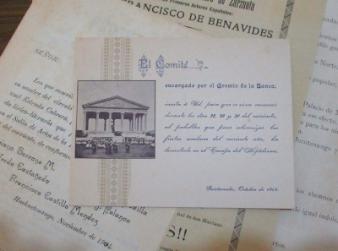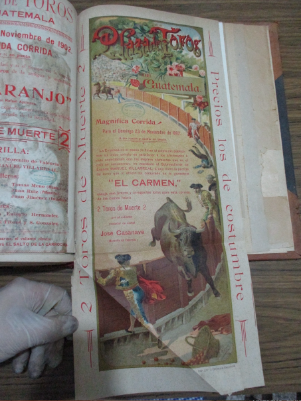Michael D. Kirkpatrick
Position
Associate Professor
Academics
B.A. (Hons.) University of Manitoba (2003)
M.A. University of Manitoba (2006)
Ph.D. University of Saskatchewan (2013)
Contact
Department of History
Memorial University of Newfoundland
St. John's, NL, A1C 5S7
Email: mkirkpatrick@mun.ca
Office: A-4015
Phone: (709) 864-6109
Research Interests
My primary research interests lie in the urban history of Guatemala City between the Liberal Reforms of the 1870s and the 1920s. Combining social history, political economy, gender analysis, and cultural studies, I examine the ramifications of shifts in the export economy for the inhabitants of the Guatemalan capital. My publications have considered diverse topics such as the bourgeoisie’s fear of anarchism; working-class consumption and bullfighting in the midst of an economic depression during the 1890s and 1900s; and the ethnic contours of manliness and manly self-restraint among both the urban working-class and urban elite.
Methodologically, I draw on a host of archival sources that detail everyday life in the city, from police statements, legislative debates, and newspapers to reports from the Ministries of Development and Governance, court records, and public denunciations. My favourite documents, however, consist of hojas sueltas: pamphlets, street literature, gossip and rumours, accusations, and advertisements that were distributed on street corners by pamphleteers and subsequently collected by the Valenzuela family and housed in Guatemala City’s Biblioteca Nacional.
Earlier in my academic career, I examined the Fuerzas Armadas Rebeldes (Rebel Armed Forces, FAR), the primary communist guerrilla movement operating in Guatemala during the 1960s. I was especially interested in cultural production among the insurgents as they sought to expand their base of support both in the countryside and urban areas. A special focus was placed on Otto René Castillo, a communist poet from Quetzaltenango who joined the FAR in the mid-1960s until he was martyred in 1967 (for more, see my chapter in New World Coming). My research on the FAR also considered transnational relationships between the Guatemalan guerrilleros and similar movements in Latin America and elsewhere in the Global South. Of particular importance was the Cuban-based Organization for the Solidarity of the Peoples of Africa, Asia, and Latin America, colloquially known as the Tricontinental, which provided ideological and military training for Guatemalan combatants.

Current Research Projects
At present, I am engaged in two research activities. The first has developed from my Social Science and Humanities Research Council Insight Development Grant on the history of capitalism in Guatemala. I consider the social impact of Guatemala’s financial crisis of 1891 arising from the issue of “treasury bills” in lieu of metal-backed coinage for the salaries of public employees. Storekeepers, importers, and market women were all hesitant to accept the treasury bills in exchange for their goods, stimulating a massive devaluation of the bills and heightened demand for silver and gold coins. Yet the “crisis” was an opportunity for speculators and members of the bourgeoisie with access to hard currency who manipulated money markets and profited by purchasing treasury bills at extremely discounted rates from the working class using silver coinage, hedging this investment on the promise that the government would redeem the treasury bills from the public at par.
The second project examines the gender politics of ambulatory women in Guatemala City. The binary of motion and stasis operated as the cultural and ideological logic of export agriculture during the late nineteenth century. Yet while statesmen, the bourgeoisie, and the judiciary championed movement and activity in most facets of life, their enthusiasm waned when considering women moving across urban space.

Courses Taught
History 1007: Critical Reading and Writing: Themes in the History of Business
History 1012: Critical Reading and Writing: The Twentieth Century
History 2150: Modern Latin America
History 2500: Global History to 1945
History 3811: The Menace of Progress: Colonialism and the Making of the Modern World
History 3840: Historical Methods
History 4421: Imperialism
History 4800: Historiography
History 4821: Reading Course
Student Supervision
Prospective undergraduate Honours students and Graduate students whose research centers on Guatemala, Central America, or Latin America; questions of modernity; the history of capitalism and political economy; US foreign policy; the history of business and consumerism; gender during the fin de siècle; colonialism/coloniality and empire; or related topics should consider applying.
I have previously supervised Honours and Masters projects on cochineal production in Guatemala; ethnicity and colonial power along the frontier of British Honduras (Belize); land tenure in the Province of Barcelona before the Second Republic; the Guatemalan syphilis trials; US-sponsored counterinsurgency during the Guatemalan Civil War; and the origins of populism in Kansas during the nineteenth century.
Prospective candidates should reach out to me at mkirkpatrick@mun.ca.
Select Publications
2023: “Crybaby Candidates and Apaleadores: Manly Self-Restraint, Violence, and Ethnicity in Late Nineteenth-Century Guatemala City,” Journal of Iberian and Latin American Research, Volume 29:2, pp. 136–153.
2022: “The Emasculation of President José María Reyna Barrios: Manliness and Economic Crisis in Fin-de-Siècle Guatemala City,” Estudios Interdisciplinarios de América Latina, Volume 33:1, pp. 89–113.
2020: “Consumer Culture in Guatemala City During the ‘Season of Luis Mazzantini’, 1905: The Political Economy of Working-Class Consumption,” Journal of Latin American Studies, Volume 52:4, pp. 735-758.
2017: “Phantoms of Modernity: The 1894 Anarchist Furor in the Making of Modern Guatemala City,” Urban History, Volume 44:2, pp. 231-252.
2014: “Mid-Twentieth Century Guatemalan Modernism and the Anesthetic of Progress,” The Canadian Journal of Latin American and Caribbean Studies, Volume 39:1, pp. 3–21.
2009: “Upon the Long Avenues of Sadness: Otto René Castillo and Transnational Spaces of Exile,” in Karen Dubinski et al. (eds), New World Coming: The Sixties and the Shaping of Global Consciousness (Toronto: Between the Lines; New York: Palgrave Macmillan).